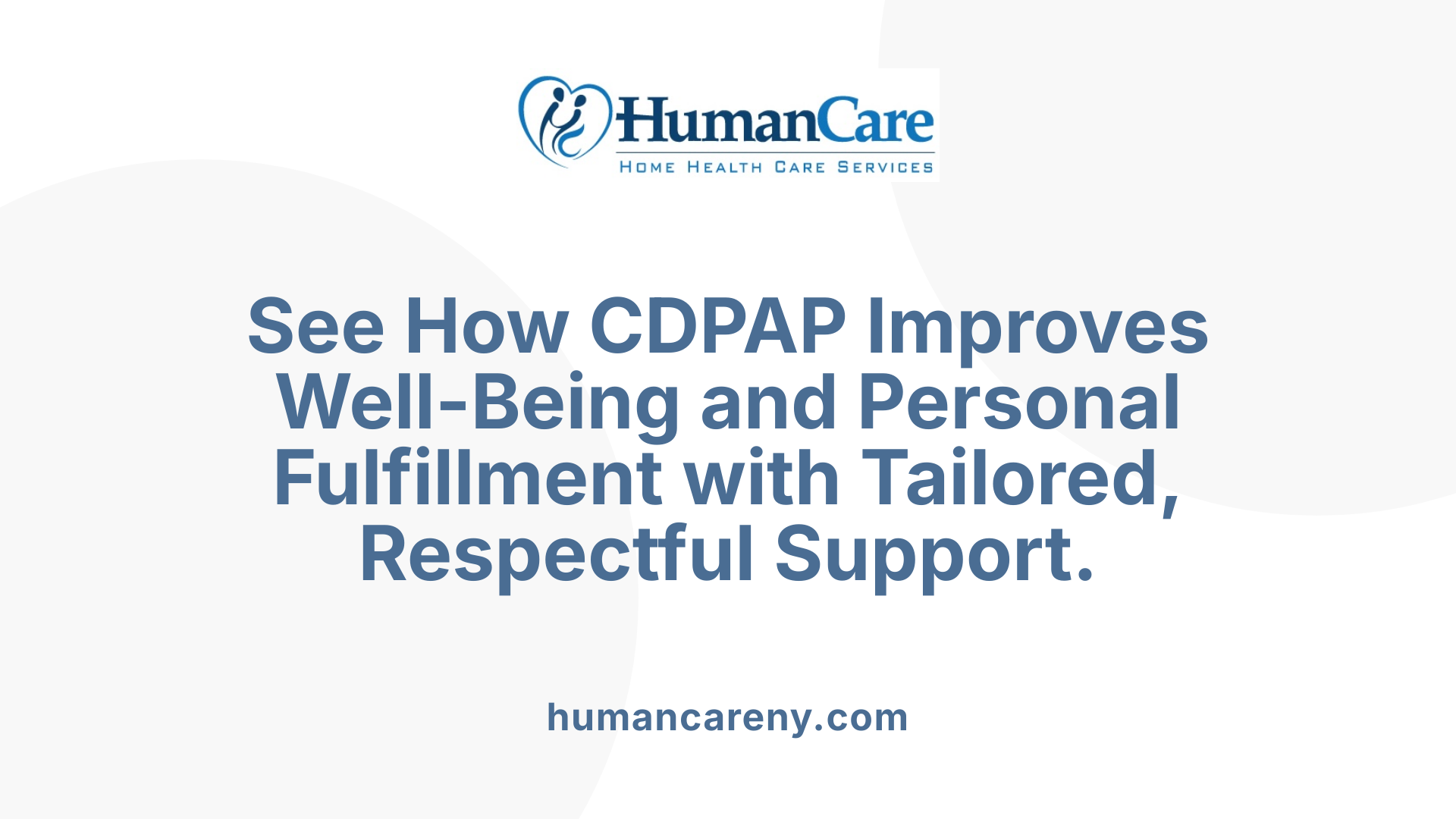How CDPAP Benefits Individuals with Developmental Disabilities
Empowering Independence through Personalized Care

Introduction to the Benefits of CDPAP for Developmental Disabilities
The Consumer Directed Personal Assistance Program (CDPAP) is transforming the landscape of home care services in New York by placing individuals with developmental disabilities at the center of their care planning. This innovative Medicaid-funded program enables recipients to choose and manage their caregivers, fostering independence, personalized support, and improved quality of life. Understanding who qualifies, the services offered, and how it integrates with other systems like OPWDD and Medicaid is crucial to recognizing its impact on individuals with developmental disabilities.
Understanding the CDPAP Program and Eligibility Criteria

What are the eligibility criteria for the CDPAP program?
The Consumer Directed Personal Assistance Program (CDPAP) in New York State is designed to offer flexible, personalized care options for Medicaid recipients. To qualify, individuals must be eligible for Medicaid and have a medical condition that is stable enough to support self-directed care. Specifically, applicants should require ongoing assistance with activities of daily living (ADLs) such as bathing, grooming, dressing, or need skilled nursing care.
In addition, applicants must be capable of self-directing their care—meaning they can make decisions about their caregivers and the services they receive—or have a designated representative, like a family member or friend, to manage these responsibilities on their behalf. They should demonstrate a need for home care services that can be provided in a comfortable, familiar environment, supporting independence.
Eligibility also hinges on the person’s medical stability and the ability to participate actively in managing their care. This helps ensure that the program effectively serves those who benefit most by maintaining their safety and well-being.
Who qualifies for the CDPAP program?
Most individuals who require home care assistance and meet Medicaid eligibility criteria in New York qualify for CDPAP. This includes a diverse range of people such as seniors, persons with disabilities, individuals with chronic illnesses, and those with developmental disabilities like autism.
Particularly, individuals with autism or other developmental disabilities stand to gain significantly from the program because it allows them to select trusted caregivers—be they family members, friends, or familiar caregivers—enabling higher levels of comfort and emotional support.
People eligible for CDPAP typically need help with basic personal activities or require skilled nursing services. Whether the need is for help with daily self-care, mobility, or complex medical requirements like wound care or medication management, the program aims to provide tailored, person-centered support.
It also accommodates individuals of all ages, making it a versatile option for children, adults, and the elderly needing long-term, at-home care.
Benefits of CDPAP for individuals with developmental disabilities
For individuals with developmental disabilities, including autism, the CDPAP offers many advantages. It empowers them to select caregivers they trust and feel comfortable with, which can significantly improve their caregiving experience.
The program promotes personal autonomy—people can decide who provides their care, shaping a support system that aligns with their preferences and needs. This personalized approach promotes dignity and independence, allowing recipients to participate actively in their daily routines.
Moreover, the familiarity of chosen caregivers can foster stronger emotional bonds, providing a sense of stability and security. This emotional well-being is essential for overall health and quality of life.
The ability to customize schedules and select caregivers—including family members—helps individuals pursue their interests and remain engaged in their communities. It also supports families by providing financial relief and acknowledging their vital role in caregiving.
In terms of health outcomes, personalized, consistent care tends to lead to better management of medical conditions, reduce hospitalizations, and improve overall life satisfaction. Overall, CDPAP represents a powerful tool to upskill community integration, independence, and personalized care for people with developmental disabilities.
| Aspect | Details | Additional Notes |
|---|---|---|
| Eligibility | Medicaid eligible, stable medical condition, need for home care | Includes persons with disabilities and chronic conditions |
| Participants | Persons requiring assistance with ADLs or skilled nursing | All ages, including children and seniors |
| Caregiver Choice | Can select family, friends, or trusted individuals | Promotes emotional comfort |
| Responsibilities | Recruit, train, supervise, and manage caregivers | Managed by recipient or designated representative |
| Benefits | Independence, personalized care, caregiver control, emotional well-being | Benefits individuals with developmental disabilities, autism, and other conditions |
Understanding these criteria and benefits ensures that those eligible can make informed decisions about joining the program and maximizing their quality of life.
How CDPAP Empowers and Supports Individuals with Developmental Disabilities

Support and services provided by CDPAP
The Consumer Directed Personal Assistant Program (CDPAP) is designed to give individuals eligible for Medicaid more control over their home care services. This program allows recipients, including those with developmental disabilities such as autism, intellectual disabilities, or cerebral palsy, to select and hire caregivers of their choice. These caregivers can be family members, friends, or neighbors whom the individual trusts.
Participants in CDPAP are responsible for recruiting, training, supervising, and, if necessary, terminating their personal assistants. They also coordinate other essential services, arrange for backup coverage, keep payroll records, and work with a fiscal intermediary to handle employment and payroll tasks. The fiscal intermediary for all CDPAP participants in New York State is Public Partnership LLC (PPL). All consumers must register with PPL by May 15, 2025, and caregivers need to complete onboarding by June 20, 2025.
The program covers a broad range of services, including personal care, skilled nursing, and medical transportation. Personal assistants undergo training to ensure they can provide safe and effective care, especially for individuals with complex health needs. This support system helps ensure that recipients receive high-quality, personalized care tailored to their unique requirements.
How it supports independence
One of the main strengths of CDPAP is its focus on promoting independence among individuals with disabilities. By allowing recipients to choose their caregivers, the program fosters a sense of control and self-determination. Participants can select caregivers who understand their routines, preferences, and needs, which leads to more comfortable and effective care.
Flexibility in scheduling and care location further enhances independence, enabling individuals to live at home and remain active in their communities. For instance, someone with autism can maintain familiar routines and relationships while receiving personalized support, contributing substantially to their well-being and autonomy.
Coupled with services provided through OPWDD, New York’s Office for People with Developmental Disabilities, CDPAP supports a comprehensive approach to care. OPWDD offers residential programs, community habilitation, day programs, and other supports that, when combined with home care, help individuals achieve greater independence and integration into society.
Another advantage of CDPAP is its inclusive nature. It supports people of all ages and various disabilities, ensuring that they receive services that suit their specific circumstances. For families, the program offers financial relief and peace of mind, knowing that their loved ones are cared for by trusted individuals.
The administrative responsibilities—such as payroll and supervision—are managed by the fiscal intermediary, easing the burden on individuals and their families. This allows them to focus on their daily lives while maintaining quality care.
In summary, CDPAP empowers individuals with developmental disabilities by giving them control over their care choices and fostering independence. Its flexible, personalized approach helps recipients remain in their homes, actively participate in their communities, and maintain their dignity and autonomy.
| Aspect | Description | Additional Details |
|---|---|---|
| Caregiver Choice | Individuals select and manage their caregivers | Family, friends, neighbors |
| Participant Responsibilities | Recruitment, training, supervision | Work with fiscal intermediary ( |
| Service Range | Personal, skilled nursing, transportation | Tailored to needs |
| Support for Independence | Autonomy, community involvement | Better quality of life |
| Administrative Support | Payroll, supervision handled externally | Eases family burden |
| Integration with OPWDD | Foster community and residential services | Promotes holistic care |
| Flexibility | Scheduling, location, care style | Adapted to personal preferences |
| Inclusive Services | All ages and disabilities | Comprehensive support |
Overall, CDPAP’s structure and resources make it a robust program that significantly enhances independence for those with developmental disabilities.
Enhancing Quality of Life through Person-Centered Care

How can participation in the CDPAP program improve quality of life for individuals with developmental disabilities?
Participation in the Consumer Directed Personal Assistance Program (CDPAP) can lead to meaningful improvements in the lives of individuals with developmental disabilities. One of its main benefits is providing greater control over their care and daily routines. Unlike traditional care models, where caregivers are assigned by agencies, CDPAP empowers individuals to select caregivers they trust and feel comfortable with. This person-centered approach fosters a sense of independence and personal autonomy.
Choosing familiar caregivers, such as family members or friends, helps create a supportive and comforting environment. For individuals with autism and other developmental disabilities, this familiarity can reduce stress and anxiety, making daily activities more manageable and enjoyable.
Additionally, the program offers personalized care options that can be tailored to meet each person's specific needs. Whether it's assistance with activities of daily living, skilled nursing, or medical transportation, care is customized, ensuring that all essential health and personal needs are addressed effectively.
By allowing individuals to direct their care, CDPAP promotes active participation in decision-making. This participation boosts confidence and encourages a sense of ownership over one's health and well-being. It can also support lifelong goals related to independence, social integration, and employment.
Overall, CDPAP fosters an environment where individuals with developmental disabilities can thrive. They experience a higher quality of life marked by dignity, independence, and personal fulfillment. The ability to receive tailored, familiar, and self-directed care significantly enhances their emotional well-being and overall health outcomes.
Why is personalized care important for individuals with developmental disabilities?
Personalized care addresses the unique needs and preferences of each individual, which is crucial for effective support and improved life satisfaction. When care plans respect personal routines, cultural preferences, and specific health requirements, individuals are more likely to engage positively in their daily activities.
In the context of developmental disabilities, personalized care empowers individuals to maintain their independence and dignity. It supports their goals for community participation, leisure, and personal development. For families and caregivers, providing tailored care through CDPAP can also reduce stress by ensuring that support is meaningful and effective.
How does the flexibility of CDPAP benefit participants?
Flexibility in scheduling and choosing caregivers allows participants to structure their care in a way that aligns with their routines and lifestyles. This adaptability makes it easier to balance personal interests, work, and social activities, fostering a more balanced and fulfilling life.
Moreover, the ability to adjust care arrangements as needs change ensures ongoing support, whether someone is experiencing fluctuations in health or transitions in life stages. This dynamic approach to caregiving makes CDPAP a sustainable and person-centered program.
What are the overall impacts of CDPAP on autonomy and community inclusion?
By supporting self-directed care, CDPAP enhances community participation and social inclusion. When individuals feel empowered and supported in managing their own care, they are more likely to engage with their communities, pursue employment, and participate in social activities.
This increased independence not only benefits the individual but also promotes greater integration and acceptance within society. The program helps break down barriers related to disability by fostering environments where individuals are valued as active, capable members of their communities.
| Aspect | Benefits | Additional Details |
|---|---|---|
| Quality of Life | Enhanced independence, reduced stress | Personalized, familiar caregiving, autonomy in care decisions |
| Care Personalization | Tailored to individual needs | Includes activities of daily living, medical needs, preferences |
| Flexibility | Schedule and caregiver choices | Supports life balance, adapts to changing needs |
| Autonomy & Inclusion | Community engagement | Promotes self-sufficiency, social participation |
This comprehensive approach illustrates how CDPAP aligns with the goals of person-centered care—supporting individuals to live fulfilling, independent lives in their own communities.
Scope of Services and Care Options in CDPAP

What types of support and services does CDPAP provide to individuals with developmental disabilities?
The Consumer Directed Personal Assistant Program (CDPAP) offers a range of personalized home care services specifically designed to meet the needs of individuals with developmental disabilities. These services include assistance with daily activities such as bathing, dressing, and meal preparation, along with skilled nursing tasks like wound care, medication management, and respiratory therapies.
A major feature of CDPAP is the ability for recipients to choose and hire their own caregivers. This means individuals can select family members, friends, or other trusted persons (excluding spouses or parents if the individual is a minor) to provide care. These caregivers are then trained and supervised by the recipient or their designated representative to ensure quality support.
Besides direct personal care, CDPAP also covers household tasks such as cleaning, shopping, and transportation essential for maintaining independence at home. The program in this manner promotes a tailored approach to care, ensuring that each individual’s unique needs and preferences are met.
Managing employment-related responsibilities is handled through a fiscal intermediary—Public Partnership LLC (PPL)—which manages payroll, benefits, and employment records. This administrative support allows recipients and their caregivers to focus on care, while PPL ensures compliance with employment laws and regulations.
Overall, CDPAP empowers individuals with developmental disabilities to have control over their care. It provides flexible and participant-directed services, enabling people to live comfortably and independently in their community. The individualized care approach helps foster dignity, stability, and a sense of autonomy for each participant.
Benefits for Individuals with Autism and Other Conditions
How does the CDPAP program benefit individuals with conditions such as autism?
The Consumer Directed Personal Assistance Program (CDPAP) offers significant advantages for individuals with autism and similar conditions by providing tailored, in-home care that aligns with their specific needs and preferences. Unlike traditional care models, CDPAP empowers recipients to select caregivers they trust and feel comfortable with, such as family members, friends, or familiar community members.
This personal choice fosters a supportive environment, which is especially beneficial for individuals on the autism spectrum. When the care team is composed of trusted figures who understand the individual's routines, sensitivities, and communication styles, it improves comfort and cooperation in daily activities.
The flexibility of CDPAP allows recipients to train and supervise their caregivers according to their unique requirements. For example, care plans can include behavioral support techniques, communication assistance, sensory accommodations, and other interventions designed to enhance the individual's quality of life.
Moreover, the program supports independence by enabling individuals to maintain their routines and participate actively in their own care decisions. With the option to modify caregiving arrangements as needs evolve, individuals can enjoy consistent and person-centered support that respects their dignity.
The training involved ensures that caregivers are equipped with the necessary skills to handle complex medical or behavioral challenges, such as managing medication schedules or implementing communication strategies suited for autism. This specialized training contributes to safer and more effective care.
Overall, CDPAP's personalized approach promotes a sense of familiarity, safety, and autonomy, which are crucial for individuals with autism. It fosters a supportive environment where they can thrive within their own homes, leading to enriched well-being, improved behavioral management, and greater overall life satisfaction.
Integrating CDPAP with Medicaid, OPWDD, and Broader Support Systems
How does the CDPAP program integrate with Medicaid and other benefits?
The Consumer Directed Personal Assistance Program (CDPAP) is closely tied to Medicaid, which funds and supports its services. As a Medicaid-funded initiative, CDPAP allows eligible individuals to take an active role in managing their home care by hiring and supervising personal caregivers, including family members and friends.
This flexibility is coordinated within the broader Medicaid framework, which provides comprehensive support for individuals needing long-term care. The program is designed to work seamlessly with other state and federal Medicaid services, such as the Home and Community Based Services (HCBS) waivers, which cover a range of supports including respite care, supported employment, and residential assistance.
A key component of integration is the use of Medicaid waivers that specifically target individuals with developmental disabilities and chronic health conditions. For example, the HCBS waiver and the Children’s waiver facilitate access to necessary services in community settings tailored to the needs of each individual.
Additionally, all CDPAP recipients must work with a statewide Fiscal Intermediary, currently Public Partnership LLC (PPL). This centralized billing and administrative system ensures smooth processing of payroll and supervises compliance, further aligning CDPAP with Medicaid’s administrative infrastructure.
By functioning within Medicaid’s expansive support network, CDPAP offers personalized, flexible care options that emphasize recipient control while maintaining the necessary oversight and funding structures.
Role of OPWDD and other supports
The Office for People with Developmental Disabilities (OPWDD) plays a significant role in supporting individuals with developmental disabilities, including many who are eligible for CDPAP. OPWDD oversees various services aimed at promoting independence and community integration.
Services provided through OPWDD include residential care, day programs, respite services, and family support, all of which can complement the personalized home care options offered through CDPAP. For individuals with developmental disabilities like autism, intellectual disabilities, or cerebral palsy, OPWDD provides specialized programs that address their unique needs.
Many individuals receiving OPWDD services also access Medicaid supports, including HCBS waivers, to further enhance their quality of life. These programs help with employment, community participation, and access to health services, often coordinated through case managers who connect individuals with necessary community resources.
OPWDD also emphasizes advocacy, outreach, and referrals, ensuring individuals and their families are aware of the services available and how to access them. For medically fragile children, additional support programs such as environmental modifications and adaptive technology are offered.
The integration of OPWDD services with Medicaid and programs like CDPAP creates a comprehensive support environment. It allows individuals with developmental disabilities to live more independently and participate actively in their communities, utilizing a combination of personalized care, community resources, and medical supports.
| Program/Support | Focus Area | Target Population | Connection to CDPAP | Additional Notes |
|---|---|---|---|---|
| Medicaid | Funding & Benefits | All eligible individuals | Main funding source; supports hiring, supervising caregivers | Includes waivers, inpatient services |
| OPWDD | Developmental Disabilities | Individuals with developmental disabilities | Provides additional specialized supports, integration with home care | Focuses on independence and community involvement |
| PPL (Fiscal Intermediary) | Administrative Support | All CDPAP recipients | Manages payroll, billing, compliance | Centralized system for streamlined administration |
| HCBS Waivers | Home & Community Services | Individuals needing support in community | Cover services like personal care, employment assistance | Funded through Medicaid, necessary for access |
This integrated approach ensures that individuals, particularly those with complex needs, receive comprehensive, personalized care that promotes independence and enhances quality of life.
Caregiver Responsibilities and Program Administration
What are the responsibilities of a caregiver in the CDPAP program?
In the CDPAP (Consumer Directed Personal Assistance Program), caregivers play a crucial role in supporting the individual’s health, safety, and independence. Their duties go beyond simple assistance; they include household management tasks, assistance with activities of daily living such as bathing, dressing, and mobility, and running errands like grocery shopping or medication pick-up.
Caregivers also accompany clients to medical appointments and other outings, ensuring they receive necessary healthcare and social engagement while maintaining safety. Providing companionship and emotional support is integral to fostering a comfortable environment that respects the individual’s dignity and preferences.
Administrative roles and responsibilities
While caregivers focus on direct care services, the program’s success also depends on proper administrative oversight. The recipient or their designated representative is responsible for recruiting, hiring, training, supervising, and, if necessary, terminating caregivers.
They must arrange for backup coverage in case the primary caregiver is unavailable and coordinate additional services as needed. Maintaining accurate payroll records and ensuring compliance with state regulations are also essential duties.
To streamline this process, all CDPAP participants work with the Statewide Fiscal Intermediary, Public Partnership LLC (PPL). This agency handles payroll processing and compliance, alleviating administrative burdens from the individual or their representative.
Transition to PPL and ongoing requirements
All CDPAP recipients are required to complete registration with PPL by May 15, 2025, and caregivers must onboard with PPL by June 20, 2025. This transition is part of a statewide effort to standardize and improve program oversight.
Participants are expected to work closely with PPL to ensure continuous service delivery, including managing payroll, updating caregiver information, and reporting any issues promptly.
Supporting individuals with diverse needs
CDPAP serves a wide range of individuals, including those with disabilities, chronic health conditions, or developmental disabilities such as autism. The program allows these individuals to hire trusted friends or family members as caregivers, promoting personalized and comfortable care.
The flexibility inherent in CDPAP helps users schedule care around their lives, supporting independence, and maintaining their daily routines.
Enhancing quality of life through tailored care
By empowering recipients to choose their caregivers and manage their care, CDPAP fosters a sense of control and dignity. It also provides financial support and recognition for family caregivers, improving overall well-being.
In summary, caregiver responsibilities extend beyond assisting with health needs—they encompass household management, emotional support, and active participation in the individual’s daily life, all within a well-structured administrative framework designed to ensure compatibility, compliance, and quality of care.
Empowering Choices for a Better Future
The CDPAP program represents a significant advancement in home care, emphasizing autonomy, personalized care, and community integration. By giving individuals with developmental disabilities the power to select and manage their caregivers, it fosters independence and improves their overall quality of life. As the program continues to evolve and expand through state initiatives and integration with other services like OPWDD and Medicaid, it promises a future where personalized, respectful, and empowering care is accessible to all who need it.
































































































